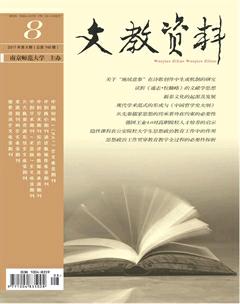淺談?dòng)⒄Z中的強(qiáng)調(diào)手段
蔡瑞辰
摘 要: 在英語交際過程中,強(qiáng)調(diào)是人們交流思想的一種重要手段。恰當(dāng)使用強(qiáng)調(diào)方式可使語言具有強(qiáng)烈的感情色彩,有助于交際的順利進(jìn)行。英語中的強(qiáng)調(diào)手段運(yùn)用非常豐富,本文系統(tǒng)地從語音、詞匯、語法、修辭四個(gè)方面探討英語中的強(qiáng)調(diào)手段。
關(guān)鍵詞: 強(qiáng)調(diào) 語音手段 詞匯手段 語法手段 修辭手段
無論說話或行文,人們?yōu)榱吮磉_(dá)不同的思想感情,常常需要給句子的某一部分以突出的地位,加以強(qiáng)調(diào),這樣就產(chǎn)生了強(qiáng)調(diào)手法。英語中主要運(yùn)用語音、語法、詞匯和修辭四種手段完成強(qiáng)調(diào)任務(wù),下面分別舉例論之。
一、用語音手段進(jìn)行強(qiáng)調(diào)
根據(jù)說話人的需要通過調(diào)心(nucleus)位置的移動(dòng),達(dá)到對同一語調(diào)組(tone unit)中不同詞語進(jìn)行強(qiáng)調(diào)的目的。
1.強(qiáng)調(diào)主語
——Which is yours and which is mine?
——Thats mine and this is yours.
2.強(qiáng)調(diào)表語
——Whose is that and whose is this?
——Thats mine and this is yours.
3.強(qiáng)調(diào)謂語
——I cant sing this song in English.
——Lucy can sing this song in English well.
4.強(qiáng)調(diào)賓語
——Tom can sing that song in English well.
——Lucy can sing this song in English well.
5.強(qiáng)調(diào)狀語
——Tom can sing this song in Chinese well.
——Lucy can sing this song in English well.
6.強(qiáng)調(diào)定語
“Its your order,” said William Tell, “not mine. ”
Well show you whose order it is...
7.強(qiáng)調(diào)補(bǔ)語
——What did she want to make her mother?
——She wanted to make her mother happy.
二、用詞匯手段進(jìn)行強(qiáng)調(diào)
根據(jù)說話人的需要,采用一些具有強(qiáng)調(diào)意味的詞、詞組,諸如形容詞、副詞(詞組)、疑問詞、否定詞、反身代詞等進(jìn)行強(qiáng)調(diào)。
1.用形容詞強(qiáng)調(diào)
(1)Dont you believe me? No, and I wont until I see you in the jar with my own eyes.
(2)I had to think of a way of preventing him from following me around all morning.
2.用副詞強(qiáng)調(diào)
(1)This beast is exactly like a wall.
(2)So Gessler decided to get even together.
3.用詞組強(qiáng)調(diào)
(1)The pacific is by far the largest ocean.
(2) The program is performed by the women of the area.
(3)What on earth are you doing here?
4.用疑問詞強(qiáng)調(diào)
What did you come here to do?
5.用不定代詞強(qiáng)調(diào)
(1)This elephant is like a snake,as anybody can see.
(2)Even the blindest person must see that this elephant isnt like any of the things you name.
6.用反身代詞強(qiáng)調(diào)
(1)May I help you carry the box upstairs?
(2)No, I can do it by myself.
7.用否定詞/詞組強(qiáng)調(diào)
(1)I dont know anything about it at all.
(2)I never enjoy meeting Bert Hall.
8.用介詞強(qiáng)調(diào)
(1)Last night I didnt have any supper except a piece of bread.
(2)They invited nobody in my office but me.
9.用連詞強(qiáng)調(diào)
It is not important to you but to me.
三、運(yùn)用語法手段進(jìn)行強(qiáng)調(diào)
說話人用改變詞序、倒裝句子、運(yùn)用被動(dòng)語態(tài)或強(qiáng)調(diào)句等手段突出語意的主要信息。
1.改變詞序
(1)a. Antonio gave Bassanio the money.
b. Antonio agreed and gave the money to Bessanio.
(2)a. Della had only $ 1.87 with which to buy Jim a present.
b. Della had only $ 1.87 to buy a present for Jim.
以上四句略加比較,就可知句(1)a 、(2)a是一般陳述,用了正常語序;而句(1)b、 (2)b句則將間接賓語借助介詞后置,強(qiáng)調(diào)了間接賓語。
2.倒裝句子
(1)a. I have never seen him before.
b. Never have I seen him before.
比較:(1)a句為正句,一般表述;(1)b句則是倒裝句,由于never一詞置于句首,受到了強(qiáng)調(diào),致使助動(dòng)詞have(部分謂語動(dòng)詞)放在了主語“I”之前。很明顯,倒裝句較之正常語序語氣重。
(2)Only then did I understand that he, too, was an Englishman.
顯然,該句強(qiáng)調(diào)的是狀語then, only是有強(qiáng)調(diào)意味的副詞,放在then前,對then再強(qiáng)調(diào)。
(3)This they kept for themselves.
該句中,this 是kept 的賓語,賓語前置,受到強(qiáng)調(diào)。
(4)There, on the shore, were nine savages.
There 與on the shore是同位語,用作表語,前置句首,受到強(qiáng)調(diào)。
3.運(yùn)用被動(dòng)語態(tài)
English was required for study in many schools.
主語English受到強(qiáng)調(diào)。
4.利用強(qiáng)調(diào)句型、助動(dòng)詞或詞組
(1)It is not only blind men who make such stupid mistakes.
(2)It is not until a blind person is treated like a normal human being that he knows his hidden strength.
It is ...that (who)...是典型的強(qiáng)調(diào)句型之一。這種強(qiáng)調(diào)句型的特點(diǎn)是將It is ...that (who)...去掉,整個(gè)句子依然成立。它一般可用來強(qiáng)調(diào)主語、賓語、時(shí)間狀語、地點(diǎn)狀語等。上邊兩個(gè)例句,句(1)強(qiáng)調(diào)的是主語,句(2)強(qiáng)調(diào)的是時(shí)間狀語。
(3)His enemies could not let Lincoln continue his work.
該句的謂語部分中,could not 本可以縮寫,現(xiàn)在不縮寫,則具有了強(qiáng)調(diào)意味。下列各句皆屬此類:
a. The doctor did not dare to tell the king the reason.
b. It was no use pretending that I had not seen him...
c. I am a citizen of Switzerland, not Austria.
d. I do not want you simply to promise me with words...
(4)I do not remember what they all were,but I do know that “mother, father, sister, teacher” were among them——words that were to make the world blossom for me.
謂語動(dòng)詞know前加了do,表示強(qiáng)調(diào)。下列各句皆屬此類:
a. Do write to me soon.
b. Do give her my regards.
c. I do hope you have a merry Christmas!
(5)There was clearly nothing left to do but drop herself onto the shabby little couch and weep.
Then it has no choice but to lie down and sleep.
該句型一般強(qiáng)調(diào)but之后的內(nèi)容(注意to do nothing but +不帶to 的不定式和has no choice but +帶to的不定式的用法區(qū)別)。
5.利用大寫
(1) Why, the blackboard was NOT a blackboard.
(2) The cry was taken up and soon everyone was nodding and saying “But He Has Nothing On!”
句(1)中的NOT一詞大寫,對“這不是黑板”作了否定強(qiáng)調(diào)。句(2)中的“But...”句大寫,有力地道出了真實(shí),對統(tǒng)治者作了最辛辣的諷刺,從而把整個(gè)故事推向了高潮。
6.運(yùn)用破折號
破折號一般表示解釋、轉(zhuǎn)折等,但有時(shí)也起強(qiáng)調(diào)作用。如:
You see, life is made up of sobs, sniffles and smiles —— but mainly of sniffles.
顯然,該句中的破折號強(qiáng)調(diào)了“生活主要的是由抽噎構(gòu)成的”的語意。
7.利用獨(dú)詞(詞組)句
(1)“Snake!”
(2)Sixty years!
顯然,獨(dú)詞句沒有贅詞,意念集中,好似異軍突起,一支獨(dú)秀,起到了較好的強(qiáng)調(diào)作用。
8.利用感嘆句(號)
(1)I want to go to school!
(2)How hard all they are working!
比較:“All the people are working very hard”. 就可知感嘆句較之陳述句語意更肯定、堅(jiān)挺;感情更充沛、濃烈。
9.運(yùn)用省略
每一種省略都減少了贅詞,避免了語意重復(fù)啰唆,突出了新的言語信息,從而達(dá)到了強(qiáng)調(diào)作用。除了獨(dú)詞句可看作省略句外,還有:
(1)省略了的感嘆句:
a. What a good girl!
b. What a great teacher!
(2)簡答句:
Where shall we have the talk on the history of the Party? In the meeting-room.
(3)習(xí)慣省略句型:
a1. Will the swimming pool be open today?
b1. No, it wont.
a2. Why not?
b2. Because theyre cleaning the pool.
上述對話中b1是簡答句,a2是習(xí)慣省略句型。
(4)承前省略:
a. Im a nurse, not a doctor.
b. We were robbed by that man who is standing there, taxed by him...
c. I was very late that morning on my way to school and was afraid of being scolded.
10.運(yùn)用插入語
在句中、句尾運(yùn)用插入語(如呼語、補(bǔ)充語等),也往往起到強(qiáng)調(diào)作用。如:
a. Where is Lucy, do you know?
She is in the reading-room, I think.
b. Go quickly to your place, little Franz, we were going to begin without you.
四、 運(yùn)用修辭手段進(jìn)行強(qiáng)調(diào)
1.重復(fù)(the repetition)
重復(fù)即說話人或作者故意重復(fù)某些詞或句子,以表達(dá)某些重要言語信息或感情的修辭方法。它和“啰唆”的根本區(qū)別在于言語的質(zhì)量上:“啰唆”給人以拖沓、累贅之嫌,而重復(fù)則使人感到“重要”,或心靈上受到感動(dòng)、沖擊。如:
(1)One dollar and eighty-seven cents...Only one dollar and eighty-seven cents.
故事開篇作者就以重復(fù)修辭格先聲奪人:$1.87這一故事線索的反復(fù)較好地突出了故事背景的重心,交代了矛盾的焦點(diǎn),設(shè)置了懸念,抓住了讀者,并為整個(gè)故事的展開籠罩了一層悲劇氣氛。
(2)It was not anger, nor surprise, nor disappointed, nor horror, nor any of the emotions that she had been prepared for.
Nor一詞在該句上的反復(fù)出現(xiàn),不僅是句子結(jié)構(gòu)的需要,而且使讀者看到了Jim眼光中所流露出的復(fù)雜感情在Della心屏上的各色投影,從而加深了讀者對Della此時(shí)此刻慌亂害怕心理的理解。
(3)“Poor boy!” the captain said over and over.
Over 一詞在該句中的反復(fù),充分表現(xiàn)了 “the captain” 對小英雄之死的無比惋惜和憐愛之情。
(4)I love you more than my own life, more than my wife, and more than all the world.(He cried.)
More than 在該句中三次反復(fù),表達(dá)了Bassanio 對Antonio的黃天厚土般深厚至極的感情。
(5)Here for four very difficult years, they worked every moment that they could spare, weighing and boiling and measuring and calculating and thinking.
連詞and 在該句中反復(fù)出現(xiàn),好似穿針引線將5個(gè)狀語動(dòng)作緊密“縫合”,不但加強(qiáng)了語言氣勢,而且生動(dòng)地展現(xiàn)了the Curies完全沉浸在放射性元素——鐳的發(fā)現(xiàn)之中的那種執(zhí)著、專注、高度緊張、繁忙、分分秒秒必爭的忘我工作情景。同時(shí),誦讀該段,使我們(讀者)感受到了鐳元素發(fā)現(xiàn)的艱辛,以及作者對the Curies的無比敬重、推崇和熱情謳歌。
2.夸張(the hyperbole)
夸張是將事物作擴(kuò)大或縮小的描述的修辭格。如:
(1)Dellas hare fell about her, rippling and shining like a brown waterfall. It reached below her knees and almost made a garment for her.
(2)I can wait all my life, sir.
句(1)借助比喻,對Della的頭發(fā)之長、之美作了過分的渲染和贊許,既為故事情節(jié)的進(jìn)一步展開(剪發(fā)、賣發(fā))做了鋪墊,又增強(qiáng)了故事的悲劇性。
句(2)顯然是夸張的說法,表明the owner對“I”(a millionaire)償還能力的信任。
還有一些修辭格,諸如比喻、頭韻等亦能突現(xiàn)主要言語信息,使之受到強(qiáng)調(diào)。
英語語言中的強(qiáng)調(diào)手段是多種多樣的,在英語語言交際中起著非常重要的作用,是英語不可或缺的一種表義手段。我們在學(xué)習(xí)和使用英語時(shí),應(yīng)把這幾個(gè)方面有機(jī)地結(jié)合起來,從而達(dá)到恰如其分的強(qiáng)調(diào)效果。隨著英語語言的發(fā)展,其表意功能將更準(zhǔn)確、更生動(dòng)。因此,強(qiáng)調(diào)手段也會(huì)越來越受到人們的重視。
參考文獻(xiàn):
[1]章振邦.新編中學(xué)英語語法[M].上海:上海譯文出版社,1990.
[2]張道真.實(shí)用英語語法[M].北京:外語教學(xué)與研究出版社,1998.
[3]鄭雪青.英語語法教程[M].大連:大連理工大學(xué)出版社,1993.
[4]董桂枝.英語特殊表現(xiàn)法[M].石家莊:河北人民出版社,1981.
[5]連淑能.英漢對比研究[M].北京:高等教育出版社,1993.

